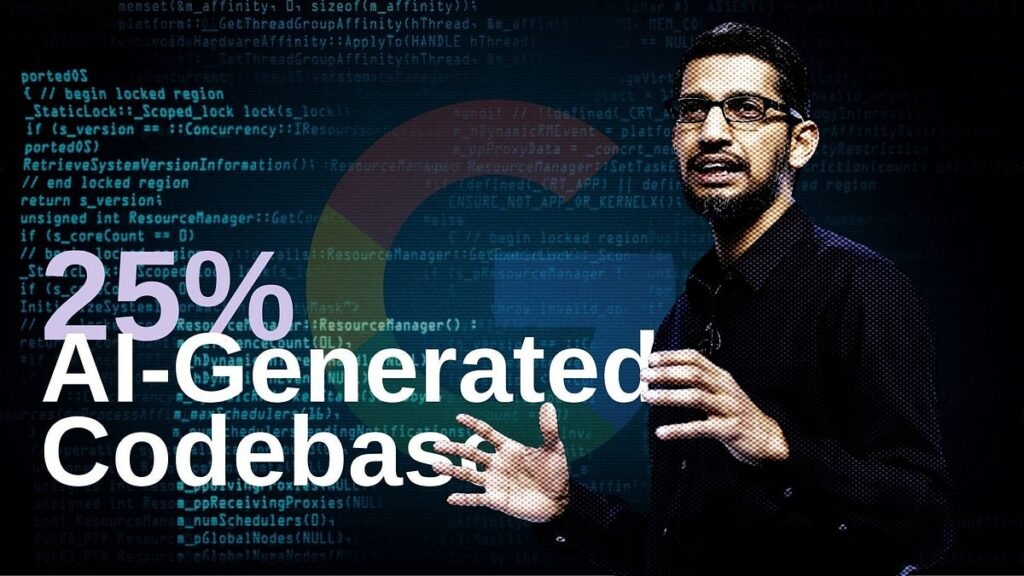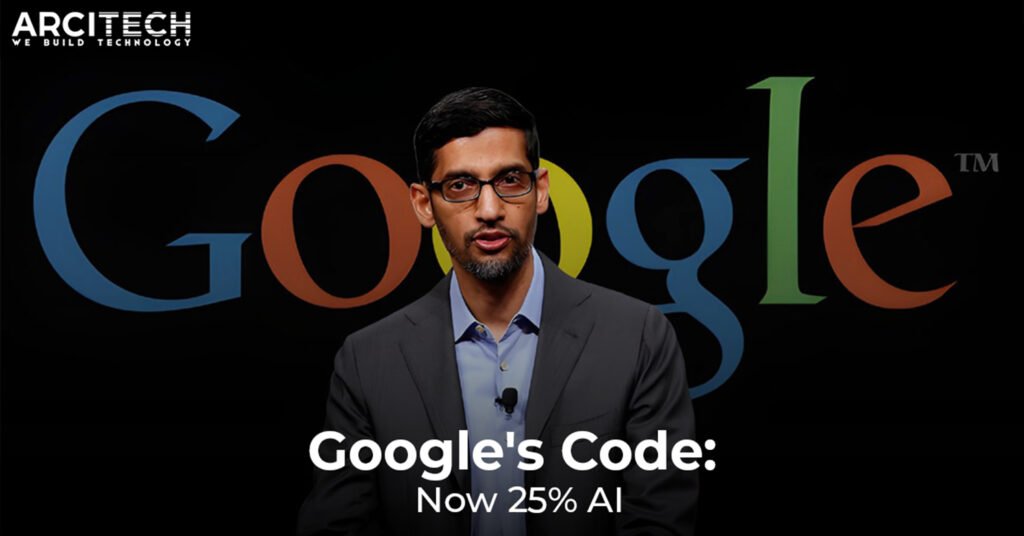In a world where technology evolves at lightning speed, artificial intelligence (AI) has already woven itself into countless aspects of our lives. But the recent news about Google’s use of AI might be one of the most surprising developments in the tech world yet. As of 2024, Google CEO Sundar Pichai shared that AI systems are now generating more than 25% of Google’s new code, with human programmers overseeing these AI-made contributions1. This milestone reveals a future where AI could become a central part of how software gets developed, but it also raises big questions: What does this mean for human programmers? Will they be replaced or empowered by AI?
1. How AI Has Already Changed Coding
AI has been slowly entering the world of software development for several years now. Platforms like GitHub Copilot, which uses OpenAI‘s technology, and Google’s own Bard have provided tools that help developers write code faster and with fewer errors2. But Google’s milestone of reaching 25% AI-generated code means that, for the first time, artificial intelligence is taking on a much larger role in actual software creation, not just as a “helper” for human coders.
How does it work? AI systems learn from vast amounts of data they are fed, which in this case includes billions of lines of code across various programming languages and frameworks. They can suggest code snippets, optimize code efficiency, and even help in debugging. Google’s AI tools use machine learning to generate code that matches the specific needs of each project, working alongside human programmers who review and approve the output3.
2. Why 25% AI-Generated Code Is a Big Deal
Reaching 25% is significant because it indicates that AI is no longer a minor assistant in software development; it’s doing a substantial amount of the work. This shift also suggests that AI’s coding abilities are reaching a level of sophistication where companies like Google can rely on them to produce a big chunk of their codebase with minimal supervision.
This milestone showcases a shift in mindset. For Google, this means that AI is not just a “nice to have” but a powerful tool that can impact the overall productivity of its engineering teams. And because Google is one of the largest and most influential tech companies in the world, other companies are likely to follow suit, increasing AI’s role in software development across the industry4.
3. How Does AI-Generated Code Affect Human Programmers?
With AI contributing a quarter of the code at a major tech company like Google, there’s an obvious question: Will human coders be replaced? The answer isn’t straightforward.
While AI can generate code faster than humans, it lacks certain qualities that are crucial for programming—like creativity, nuanced problem-solving, and ethical decision-making. AI can’t truly “think” like a human and doesn’t understand the broader goals of a project beyond the data it’s been fed. Thus, human programmers are essential for shaping and overseeing the AI’s output, ensuring the code meets high standards and aligns with the company’s strategic goals5.
Furthermore, AI in coding is likely to shift the focus of human programmers. They might spend less time on repetitive or straightforward tasks and instead focus on complex, high-level tasks that require critical thinking. Programmers could become more like “code supervisors” or “architects” who guide AI systems to produce the desired results.
4. The Pros and Cons of AI-Generated Code
Pros:
- Increased Efficiency: AI can write simple or routine code faster, helping teams meet deadlines and focus on more strategic tasks.
- Reduction in Errors: AI can identify and fix bugs or suggest optimizations faster than human eyes might.
- Better Resource Allocation: By automating repetitive tasks, companies can save time and potentially reduce costs.
Cons:
- Loss of Entry-Level Jobs: If AI handles basic coding tasks, entry-level jobs could become scarce, making it harder for beginners to break into the field.
- Dependency on AI: Relying heavily on AI might mean that human programmers lose touch with certain coding skills, which could become an issue if AI systems malfunction or introduce hidden bugs.
- Ethical and Security Risks: AI lacks judgment in terms of ethics, and it could unintentionally produce insecure or biased code.
5. Will AI Be Able to Handle Complex Coding Tasks?
For now, AI systems like Google’s are good at handling routine or standardized coding tasks. They excel in generating code for functions that are repetitive or where there are clearly defined patterns. However, more complex coding tasks—such as building a brand-new system from scratch or creating unique algorithms for specific business problems—still require human creativity and problem-solving abilities6.
The future, however, is uncertain. As machine learning models become more advanced, they might one day handle more complex tasks. But the general consensus is that for the foreseeable future, AI will remain a valuable assistant, rather than a full replacement for human developers.

6. What Skills Will Be Important for Future Programmers?
With AI systems handling more of the coding, the skill set required for programmers might shift. Here are some skills that could become increasingly valuable:
- AI Oversight: Knowing how to guide and supervise AI systems will become critical. This includes understanding how machine learning models function and being able to spot when AI code doesn’t meet standards.
- Critical Thinking and Problem Solving: Since AI can handle repetitive tasks, humans will be left to tackle more complex and unique challenges.
- Project Management and Collaboration: As programming teams work alongside AI, coordinating between human and AI-generated efforts will be key.
- Data Science and Machine Learning: Understanding how AI itself works could give programmers an edge in fine-tuning and guiding AI tools.
- Ethics and Security in AI: Since AI doesn’t understand ethics or security concerns, programmers who can build safeguards and understand the ethical implications of AI decisions will be in high demand.
7. The Future of Coding Education
The rise of AI in programming also has implications for coding education. If entry-level tasks become automated, new programmers might need a different type of training. Rather than focusing solely on coding fundamentals, coding courses might include modules on AI collaboration, ethics, and overseeing machine learning systems7.
This doesn’t mean that coding skills will be irrelevant, but it does mean that the way we teach programming might evolve. Learning the basics of coding will still be essential, but it could be taught alongside AI tools, helping students understand how to code both independently and in collaboration with AI.
8. Industry Impact: How Will AI Change the Tech Job Market?
Google’s decision to use AI for a significant portion of its coding tasks will likely impact the broader tech industry. Other companies might adopt similar tools, which could shift the demand for different types of tech roles. Companies might need fewer coders who specialize in routine programming, but more experts in AI oversight, data analysis, and ethical AI implementation.
For smaller companies or startups, AI-driven coding could lower barriers to entry. With AI systems handling a portion of the development workload, smaller teams could create complex applications without hiring a large staff of programmers. This democratization of coding could lead to increased innovation across industries, as more players can afford to develop software.
9. Are There Risks in Relying on AI for Coding?
There are risks in relying heavily on AI for code generation. AI systems are not infallible and might produce code with subtle bugs or security flaws. Additionally, as humans spend less time on basic coding tasks, there is a chance that essential coding skills could atrophy within the tech workforce8.
Furthermore, AI systems learn from the data they are trained on, which could introduce biases or security vulnerabilities if the training data is not carefully curated. Human oversight is necessary to mitigate these risks, but if programmers become overly reliant on AI, they might miss critical issues that could affect software quality or security.
10. The Big Picture: How AI and Human Coders Can Coexist
The future of programming will likely be a partnership between humans and AI. In this relationship, AI acts as a powerful tool that can handle repetitive tasks, optimize code, and help identify bugs, while human programmers take on a supervisory role, ensuring the code aligns with strategic objectives and ethical standards.
This approach, sometimes called “augmented coding,” combines the strengths of AI—speed, accuracy, and consistency—with the strengths of humans—creativity, strategic thinking, and ethical judgment. The 25% milestone at Google serves as an example of how AI and humans can work together to produce high-quality code more efficiently.
Conclusion: Is AI the Future of Coding?
The answer is both yes and no. AI is certainly transforming how code is written, and its role in programming is only expected to grow. But for now, human coders are essential for managing the complex and creative aspects of software development. Google’s decision to have AI generate 25% of its code shows that AI can be a valuable partner, but it’s still just one part of the equation.
As AI continues to evolve, programmers will adapt, learning new skills and finding new ways to work alongside AI. The future of coding isn’t about AI taking over; it’s about humans and AI working together to create better, faster, and more efficient software.
References
Additional Reading
- History of artificial intelligence
- Software engineering
- Computer programming
- Code generation
- Software development process
Footnotes
- “Google’s AI Journey: Transforming Software Development” (2024). Google AI Blog. ↩
- Tung, L. (2023). “GitHub: Here’s how many developers are actually using AI to write code.” ZDNet. ↩
- Li, F., et al. (2022). “Competition or Collaboration? Understanding the Relationship between AI and Software Development.” IEEE Software, 39(4), 32-39. ↩
- Johnson, M. (2023). “AI in Software Engineering: Current Trends and Future Prospects.” Communications of the ACM. ↩
- Wilson, R., et al. (2023). “Ethics and Security Considerations in AI-Assisted Programming.” Journal of Systems and Software. ↩
- Brown, A. (2023). “The Limitations of AI in Complex Software Development.” IEEE Transactions on Software Engineering. ↩
- Davis, K. (2023). “Reimagining Computer Science Education in the Age of AI.” ACM SIGCSE Bulletin. ↩
- Martinez, S. (2023). “Security Implications of AI-Generated Code.” Journal of Cybersecurity. ↩
This article was originally published on Arcitech.ai. For more insights on AI and technology, visit our website.

